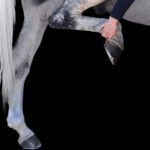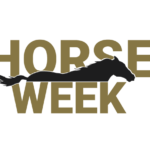 Amy Tryon and Poggio II at the Olympics | © Nancy Jaffer
Amy Tryon and Poggio II at the Olympics | © Nancy JafferMarkoupolo, Greece, August 15, 2004 — U.S. eventers didn’t get off to a rousing start at the Olympics, but hope for a medal is on the horizon.
Darren Chiacchia placed an encouraging fourth (44.6 penalties) with a version of his usual smooth test on Windfall II (except for one heart-stopping moment when the black stallion kicked out abruptly at the canter.)
“Keep going, keep going,” he told himself, and he was able to gloss over the error.
But Amy Tryon wound up 11th on Poggio II (50.6), and Julie Richards had a worse test than usual on Jacob Two Two, who is no dressage luminary anyway. Her score of 65.40 put her in a tie for 28th.
However, two stars–Kim Severson on Winsome Adante and John Williams on Carrick–are yet to ride. After we’d all had a chance to look at the score sheet and saw only one American name in the top 10, I said brightly to U.S. coach Mark Phillips, “That means the guys tomorrow have to make up a lot of ground.”
“You got it in one,” he said, (rather grimly I thought.)
Under the revised format for these Games, the best three of five scores count. Since Darren’s effort was well-rewarded, the U.S. could be in good shape before cross-country.
Though there were no team standings available (some teams had only two riders go today, while others, like the U.S., had three), the Germans have to be ahead. Bettina Hoy put in her usual high-caliber test with the perky gray, Ringwood Cockatoo, earning 32 penalties to take a 12-point lead over a charming newcomer, Heelan (love that name!) Tompkins of New Zealand on Glengarrick. Bettina’s teammate, Hinrich Romeike, is third with Marius, just 0.2 penalties ahead of Darren.
Heelan was refreshingly excited about the performance of Glengarrick. “My horse goes the same whether he’s in a pony club show or the Olympics,” she said.
Although her goal was to “beat Bettina,” Heelan admitted that she does get nervous “and my knees go like jelly.” She trains for dressage with Chris Bartle, the coach of the German team.
I asked Bettina (jokingly) whether the Germans would have fired Chris if Heelan had beaten her. Bettina was quite serious in her reply, saying definitely not. “See how we help each other?” She said the spirit of cooperation among eventers is in the spirit of the “Olympic ideal.”
Okay, enough of that. Back to the Americans.
Amy did an admirable job with her former mountain pack horse, who was bright and on the bit, making just one fumble behind in a flying change to wind up with a score of 50.6 penalties.
Amy is neither a shamateur nor a blatant professional rider; she’s the type of athlete for whom Baron de Coubertin revived these games 108 years ago here. A full-time firefighter, she doesn’t have enough vacation to do all she has to do as a rider. In the Olympic spirit, her co-workers gave up 34 days of their vacations to help her, enabling her to train for the Games.
Julie Richards had things tougher than nearly anyone else in the atmospheric dressage arena. The snapping of the flags in 24 mph wind got Jake going. Julie was second-guessing herself about whether her warm-up should have been longer. Jake was obviously on the muscle, and broke into an exuberant canter from the trot on the diagonal.
Blyth Tait, the former Olympic and World Champion who is making his final Olympic appearance, got the tail end of the winds that bothered Julie. Ready Teddy’s score was 63.8, putting Blyth 24th and probably well out of individual medal range.
Cross-country isn’t until Tuesday, but I just had to tell you about the course, because it’s so interesting. This is a very brown tract ringed by dried-out-looking mountains; think of southern California going toward sepia tone and you’ve got it. So the green of the cross-country turf is a startling emerald in these surroundings. It’s dotted with olive trees (so neat to see the little green olives on the branches) and fig trees (so neat to see the little figs, etc.)
The route was designed by Albino Garbari, the Italian who also did the course for the 1998 World Equestrian Games in Rome.
Some have said it might be too easy, but Chris Hudson, the New Zealand chef d’equipe, believes, “There’s a danger of taking cross-country too lightly.” A lot of it is uphill, he pointed out, and with the new non-steeplechase format in effect, no one really knows what to expect.
Julie Richards felt it was going to be tough to make the time allowed of 9:46. Still, she noted, “it’s a very fair course.”
It’s also practically a little museum, with many placards describing what got dug up during construction. There were cemeteries on the land yielding some interesting pottery. Their photos and descriptions are on the signs; I’m sure the riders will read them as they gallop by.
The fences are astounding; and many are in keeping with the country’s heritage. There’s a giant urn to be jumped (how WILL the horses do that?), and a little shrine, like the ones found along the roadsides here, to be cleared.
I love to walk around the course and think how my spooky horse, Breeze, would react to these jumps. Not that we’d jump them; I just try to decide whether he’d even go near them.
The offset double of giant windmills? Nope. The fountain actually bubbling with water? Nope. But I actually think we could even get over the last fence, a red panel covered with gold Chinese characters, symbolic of the next Olympic Games in Beijing.
Speaking of Breeze, I was thrilled to see that his sire, Zauberklang, is represented here by another of his offspring, a Swiss horse named Peppermint III. That’s as close as I (or Breeze) will ever get to participating in the Olympics but honestly, it’s so exciting to have even this very vague connection with a competitor.
Still, I think I’ve earned my Olympic stripes in another way. This is my seventh Games, and I’ve seen them grow from a festival of athletes to a festival of (to sum it up in one word) excess. And that word particularly applies to security, though with the state of the world today, you can’t be too careful.
Even so, I was more afraid of finding mildew in my accommodations (more about that another day) than terrorists in the streets, but as you know, the Greeks aren’t taking any chances.
They’ve crossed the billion-dollar barrier in trying to avert mayhem. When you cover the Olympics, you get used to the “mag and bag” routine, where your belongings are x-rayed and you walk through a scanning machine like the ones at the airport, every time you enter a building.
This morning at the equestrian venue, however, I got an overzealous policewoman who wanted to go through my purse (brave soul). “What’s this?” she asked, holding up my wallet. I told her; maybe they don’t have wallets in Greece.
“What’s this?” she wondered, holding up a box of matches.
Now I KNOW they have matches in Greece, because so many people smoke and I’ve been privileged to sit next to them in the past few days.
“What’s this?” she queried, grabbing a handful of quarters and nickels. “Coins from your country?” she said accusingly, as if I were planning to pollute Greece’s money supply.
Meanwhile, I was losing patience because I (or rather the Olympic transport system) was running late. It took a bus an hour and 15 minutes to get here from my media village, a trip that should have lasted no longer than 40 minutes. I was eager, very eager, to get to the grandstand.
Anyway, you have to get used to delays. The Greek national motto apparently is “just a minute,” but it’s usually more like 10 or 15.
Of course, I had to take the search in stride, as one does with all the little inconveniences that are part of the Olympics. They’re the price you pay for a front-row seat at the greatest Games on earth.





